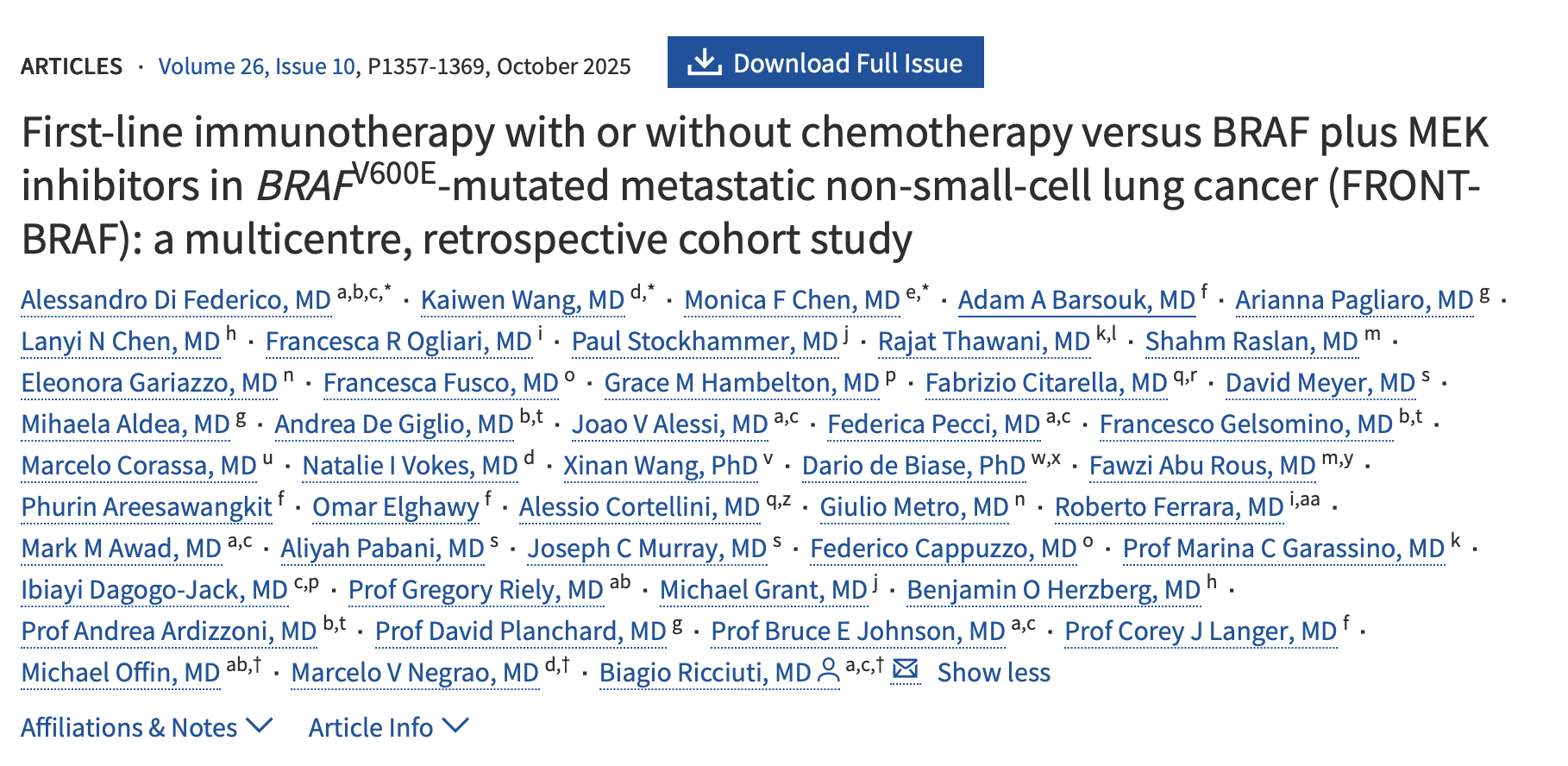Alessandro Di Federico, Medical Oncologist and Ph.D. student at the University of Bologna, shared a post on LinkedIn about a recent article on he and his colleagues co-authored, published in The Lancet Oncology:
“For patients with stage IV, BRAF V600E-mutated non-small cell lung cancer (NSCLC), the optimal first-line treatment is still a subject of debate. Unlike in BRAF V600E-mutated melanoma, where immune-checkpoint inhibitors (ICIs) represent the preferred first-line choice, the much rarer prevalence of this mutation in NSCLC makes the feasibility of comparative, randomized clinical trials challenging.
Most oncology guidelines currently identify BRAF+MEK inhibitors as the preferred first-line choice, based on the high activity of BRAF+MEK inhibitors demonstrated in single-arm phase 2 trials and on the general concept that oncogene-addicted NSCLCs are less responsive to ICIs. However, not all oncogenes are the same. Patients with BRAF-mutated NSCLC frequently have a history of tobacco use and high PD-L1, making them more similar to the KRAS-mutated population than the EGFR/ALK altered one.
In the FRONT-BRAF study, a global effort involving 17 major cancer centres just published in the Lancet Oncology (The Lancet Group), we compared first-line ICI +/- chemotherapy and BRAF+MEK inhibitors for patients with previously untreated, stage IV, BRAF V600E-mutated NSCLC.
Key findings were:
- higher objective response rates with BRAF+MEK inhibitors, but similar PFS
- significantly longer median OS (40.9 vs 25.2 months) with first-line ICIs +/- chemotherapy;
- the OS benefit with ICIs was particularly driven by patients with a history of tobacco use, PD-L1+, without baseline brain metastasis, and with TP53 co-mutations;
- significantly longer median PFS with BRAF+MEK inhibitors in patients who had never smoked and in those without TP53 co-mutations;
- Toxicity rates were not increased when BRAF+MEK inhibitors were administered after ICI, unlike other targeted treatments (e.g., EGFR, ALK, and KRAS G12C inhibitors).
Within the ever-increasing complexity of precision medicine, we hope our findings offer guidance to inform more personalized treatment approaches for patients with BRAF V600E-mutated NSCLC.”
Title: First-line immunotherapy with or without chemotherapy versus BRAF plus MEK inhibitors in BRAFV600E-mutated metastatic non-small-cell lung cancer (FRONT-BRAF): a multicentre, retrospective cohort study
Authors: Alessandro Di Federico, Kaiwen Wang, Monica F. Chen, Adam A. Barsouk, Arianna Pagliaro, Lanyi N. Chen, Francesca R. Ogliari, Paul Stockhammer, Rajat Thawani, Shahm Raslan, Eleonora Gariazzo, Francesca Fusco, Grace M. Hambelton, Fabrizio Citarella, David Meyer, Mihaela Aldea, Andrea De Giglio, Joao V. Alessi, Federica Pecci, Francesco Gelsomino, Marcelo Corassa, Natalie I. Vokes, Xinan Wang, Dario de Biase, Fawzi Abu Rous, Phurin Areesawangkit, Omar Elghawy, Alessio Cortellini, Giulio Metro, Roberto Ferrara, Mark M. Awad, Aliyah Pabani, Joseph C. Murray, Federico Cappuzzo, Marina C. Garassino, Ibiayi Dagogo-Jack, Gregory Riely, Michael Grant, Benjamin O. Herzberg, Andrea Ardizzoni, David Planchard, Bruce E. Johnson, Corey J. Langer, Michael Offin, Marcelo V. Negrao, Biagio Ricciuti
Read the Full Article on The Lancet Oncology

More posts featuring Alessandro Di Federico.


